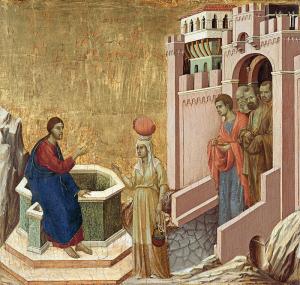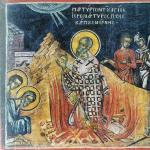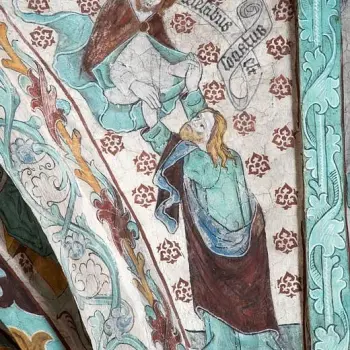I continue to be impacted by one of President Russell M. Nelson’s statements at General Conference.
We see faithful women who understand the power inherent in their callings and in their endowment and other temple ordinances. These women know how to call upon the powers of heaven to protect and strengthen their husbands, their children, and others they love. These are spiritually strong women who lead, teach, and minister fearlessly in their callings with the power and authority of God!
Photine
I read the name Photine in a very unexpected setting and felt compelled to find out more about her life.
I discovered she was the Samaritan woman at the well in John 4. John 4 tells of her encounter with Jesus Christ.

As Jesus sat at Jacob’s well, Photine came to draw water. Jesus asked her for a drink. Noting His Jewishness, she seemed surprised He would ask a Samaritan for anything.
He told her she asked the wrong question. She could have asked Him for living water.
She pointed out that He lacked anything with which to draw water. Was He greater than Jacob who gave them the well?
Jesus answered and said unto her, Whosoever drinketh of this water shall thirst again: But whosoever drinketh of the water that I shall give him shall never thirst; but the water that I shall give him shall be in him a well of water springing up into everlasting life.
She wanted that water.
Jesus acknowledged situations in her life and she acknowledged the Savior as a prophet.
Then come two verses which always caused me some pause, but not enough to do anything about. What did the Savior mean?
The woman saith unto him, Sir, I perceive that thou art a prophet. Our fathers worshipped in this mountain; and ye say, that in Jerusalem is the place where men ought to worship.
Jesus saith unto her, Woman, believe me, the hour cometh, when ye shall neither in this mountain, nor yet at Jerusalem, worship the Father.
As I discovered more about Photine, I understood how Savior’s prophecy was fulfilled.
She watched for a messiah. Jesus said He was the Messiah. She ran to tell family, friends, fellow citizens. A large group gathered. They asked Him to stay. He stayed with them for two days. And many, after hearing and seeing Jesus, believed.
And that’s where the canonical account of Photine ends.
Photine’s Evangelical Ministery
Photine, meaning “luminous one” or “enlightened one” received baptism. She shared the Gospel message with her five sisters and two sons who also gladly received it. She continued living in Sychar, Samaria, but traveled far and wide spreading the gospel message.
After Photine heard of Apostle Paul and Paul’s martyrdom, she and her family moved to Carthage in Africa. They continued fearlessly sharing Christianity in Carthage until Photine had a vision of Jesus Christ who told her to go to Rome. She sailed to Rome with many Christians.
Apparently, as soon as she stepped onto land, she began preaching Jesus Christ to any who would listen. Amazed, the people asked who she was and why would she preach Christianity with such boldness! Christians experienced severe disfavor in the Roman Empire.
Nero ordered soldiers to arrest her. But before they could, she, her sisters, and a son went directly to Nero. Shocked, he asked why she would do that.
She responded by saying they wanted to teach Nero to believe in Christ. Nero demanded to know if they would die for Jesus. Photine responded for them all.
“Yes, for the love of Him we rejoice and in His name we’ll gladly die.”
Nero ordered his men to beat their hands with iron rods. No harm or pain came to any of them.
Nero threw the men into prison but tried a different strategy on Photine and her sisters. He sent them to a gilded room full of the world’s finery. The six women sat on golden thrones. He ordered his daughter Domnina to convince the women to rescind their testimonies. However, while talking to Photine and her sisters, Domnina and the 100 women with her actually converted to Christianity.
Furious at Domnina’s conversion, Nero condemned the family to burning. Like Shadrach, Meshach, and Abednego, the fiery furnace did not consume them. Nero brought poison. Photine took the poison first so Nero could see the glory and power of God. The poison had no effect on them.
Nero held them in prison for three years until he realized the prison itself became a house of God with many converts within and others who came to see the family and became converted, too.
Nero brutally, horrifically, executed Photine’s family and beheaded the other followers. But Nero threw Photine into a deep, dry well. She mourned that she remained while her family had testified of Jesus with their lives.
After 20 days, Nero brought her out of the well and asked if she’d now relent in her faith and offer sacrifice to his gods. She spit in his face and refused. He threw her back down the dry well where she ultimately surrendered her soul to the God who gave her living water at Jacob’s well.
As I read her story, I remembered the Savior’s prophecy,
Jesus saith unto her, Woman, believe me, the hour cometh, when ye shall neither in this mountain, nor yet at Jerusalem, worship the Father.
She and her sisters went from Samaria to Carthage to Rome and continued to “ lead, teach, and minister fearlessly in their callings with the power and authority of God!”
We can stand in the same confidence, revelation, and power as Photine and her sisters stood 2,000 years ago. Living water is available still today. And as we seek to fulfill the Lord’s work and glory in the salvation of mankind, He will guide and direct our paths and reveal Himself to us.
Apolytikion of Photine, the Samaritan Women
All illumined by the Holy Spirit, thou didst drink with great and ardent longing of the waters Christ Saviour gave unto thee; and with the streams of salvation wast thou refreshed, which thou abundantly gavest to those athirst.













